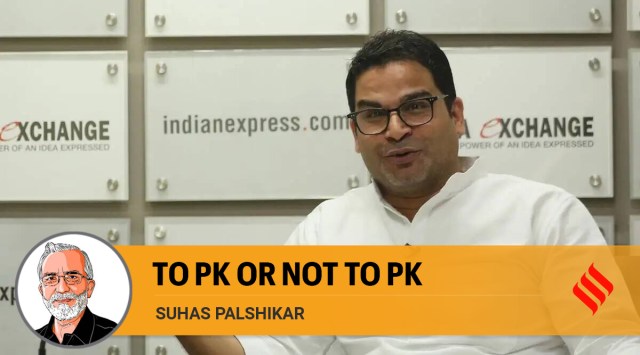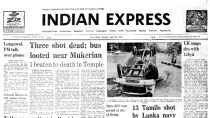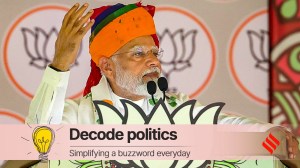- India
- International
What the Prashant Kishor-Congress episode tells us
Suhas Palshikar writes: It is symbolic of the party's abdication of centrist, non-sectarian politics. It also raises fundamental questions about nature of party politics
 Another critical issue someone like PK underlines is the nature of party politics. He represents the professionalisation of politics. (File Photo)
Another critical issue someone like PK underlines is the nature of party politics. He represents the professionalisation of politics. (File Photo)We may not have heard the last word yet on the Prashant Kishor (PK) episode in connection with the Congress party. It was bold on his part to offer to play a role larger than that of a mere consultant. For a party that is on the back foot, spurning the offer of PK’s services was a bold move. Kishor exemplifies the new breed of political actors who cross over from the threshold of consultancy and bring a new approach to politics. Let us consider the party on the one hand and the phenomenon of “new politics” that PK symbolises on the other hand.
How does one make sense of the Congress’s response? As is its practice, the party took an overtly bureaucratic approach to PK’s offer. It also tried to delay the process as much as it could. So much so that one got an impression that the Congress did not want anyone to help it come out of the pathetic situation it is currently in. The baggage of being the oldest party and the self-perception of being the only all-India alternative to BJP weighed heavily on the Congress’s response.
 PK wanted a key role in implementing his ideas about the survival of the party. This meant that PK wanted to be equal to the three Gandhis. Obviously, that didn’t go well with many party leaders. It is not clear how insecure either of the Gandhis felt due to this proposal but they were surely not enthusiastic about it. Besides, a new power centre would have curtailed the powers of two other sets of leaders — the Delhi-based confidants of the Gandhi family and the state-level bosses. Not many belong to the latter category.
PK wanted a key role in implementing his ideas about the survival of the party. This meant that PK wanted to be equal to the three Gandhis. Obviously, that didn’t go well with many party leaders. It is not clear how insecure either of the Gandhis felt due to this proposal but they were surely not enthusiastic about it. Besides, a new power centre would have curtailed the powers of two other sets of leaders — the Delhi-based confidants of the Gandhi family and the state-level bosses. Not many belong to the latter category.
This fiasco, then, was born out of a convergence of three factors: A less-than-enthusiastic reception of the PK plan by the apex leadership, the self-interest of those without much of a popular base but who have access to the top and the misgivings of leaders with a limited regional mass base.
There would have been no need to take the PK episode seriously if the Congress had been actively engaged in its reconstruction. But during the past eight years, the Congress has been moving from one crisis to another. Electoral defeats constitute one part of this story. After every defeat, we are told that the party will introspect but there is neither introspection nor course correction. In these eight years, the party has lost the will to win elections; in fact, it has cultivated a habit of losing to such a degree that when it does win, it is unable to handle victory — as was seen in Madhya Pradesh and Rajasthan. Not a single move in eight years can be identified as a serious effort to overcome the dismal state of affairs in the party.

The offer by PK was valuable because the present moment in Indian politics is about much more than the political fortunes of the Congress. It is about the survival of competitive politics and the centrist space, that allows the slow but sure march of democracy.
There is a gap between the Congress party and the Congress space in Indian society. If the Congress party is not urgently reactivated, this gap will only widen and the Congress space will shrink further. That Congress space is marked by the centrist and non-sectarian tendencies in our public life. The failure of the Congress party to own this space has already meant that it either gets disintegrated or is occupied by disparate state-level forces, many of which may eventually be steamrolled by the now-dominant BJP. Surprisingly, not many in the party seem to recognise this reality. At the top, there is confusion over who will lead the party; at the middle, there is a short-sighted concern about individual and factional survival and at the bottom, the entry-level workers are left without purpose and promise.
That is where outside interventions become pertinent, which PK symbolises. Such interventions are not without their inherent traps. Organisationally, the trap is tricky: Someone like PK will bring new ideas and strategies but how will he ensure the in-flow of new members? Or will he turn around the party’s future with the existing cadres alone? In the entire public spectacle that unfolded over the question of leadership and the role of newcomers, the party does not seem to have discussed this critical issue.
Another critical issue someone like PK underlines is the nature of party politics. He represents the professionalisation of politics. In itself, this is an attractive path and has been underway for a long time: Most parties take recourse to consultants, they commission voter surveys and monitor popular perceptions about policies and leaders. In fact, leaderships are overburdened with the idea of image building rather than actually connecting with voters. Election strategists like PK have become a common feature of electoral politics, from the local to the national level, because of this transformation. But we do not know what happens when a professional strategist crosses the threshold and seeks to become a political actor.
Newsletter | Click to get the day’s best explainers in your inbox
In the role as a consultant, we know the “commodity” called PK but we do not know him as a leader: What are his ideological inclinations? What policies would he prefer for his voters? Does he look upon people as supporters, stakeholders, citizens or just as voters? For that matter, how does a political consultant look upon politicians? Are they merely carriers of the brand or are they human agents negotiating alternative political routes, with dreams of their own?
Finally, can a party be rejuvenated by the intervention of a consultant-turned-professional? Does it not require the motivation and human agency of its active workers? Or, are parties set to turn into electoral machines alone?
These and other similar issues expand the Congress-PK episode beyond the fortunes and tactics of one party. They pose fundamental questions that are obscured by the debates over personalities and temporary turnarounds in the fortunes of parties.
This column first appeared in the print edition on April 30, 2022, under the title ‘To PK or not to PK’. The writer, based in Pune, taught political science and is currently chief editor of Studies in Indian Politics
EXPRESS OPINION
More Explained
Apr 23: Latest News
- 01
- 02
- 03
- 04
- 05









































